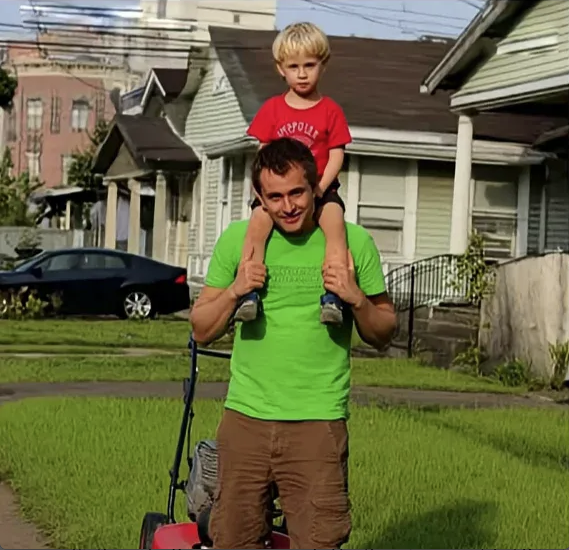
I helped elderly Mrs. Whitmore when she fell while mowing, and from then on, I checked on her daily with my son Jack, as she had no family visits.
Before she passed away, she gave me an old wooden chest. Weeks later, a lawyer arrived at my door with a plane ticket. Mrs. Whitmore had left me her late husband’s aviation company, worth millions.
Her note read: “You were the son I never had.”
Mrs. Whitmore fell while mowing. Elderly woman, physically demanding task, accident waiting to happen. But she was mowing her own lawn—probably because she had no one to do it for her, no family offering help, maintaining independence because that’s all she had.
“I helped elderly Mrs. Whitmore when she fell.” That initial act of kindness—helping a neighbor who fell—started everything. Most people would have helped her up, made sure she was okay, maybe called someone, then gone about their day. But this person made different choice.
“And from then on, I checked on her daily with my son Jack, as she had no family visits.” Daily visits. Not weekly or when convenient, but every day. Bringing young Jack along, teaching him to care for elderly neighbors, modeling compassion through action. And the reason was clear: she had no family visits. No children checking in, no grandchildren stopping by. Just an elderly woman alone, maintaining her property because no one else would.
“Before she passed away, she gave me an old wooden chest.” A parting gift from dying woman to the neighbor who’d checked on her daily. An old wooden chest—probably seemed sentimental, maybe contained photos or mementos. The kind of thing you accept graciously even if you’re not sure what to do with it.
“Weeks later, a lawyer arrived at my door with a plane ticket.” That escalation—from wooden chest to lawyer with plane ticket—signals this wasn’t simple bequest of sentimental items. Mrs. Whitmore had left something significant.
“Mrs. Whitmore had left me her late husband’s aviation company, worth millions.” Not money. Not house. An entire aviation company. Her late husband’s legacy, worth millions, left to the neighbor who checked on her daily with his son Jack. To the person who helped when she fell mowing, then kept showing up when no one else did.
“Her note read: ‘You were the son I never had.'” That sentence explains everything. Mrs. Whitmore had no family visits—probably because she had no family, or her family had abandoned her. She was alone. Then a neighbor started checking on her daily, bringing his young son, treating her like family. And she recognized it: this man had become the son she never had. So she left him what sons typically inherit—her late husband’s company, his life’s work, the legacy that would have gone to children if she’d had them.
The photo shows the neighbor with young Jack on his shoulders, walking past Mrs. Whitmore’s house, mowing her lawn. This is what he did—helped elderly neighbor, brought his son, took care of tasks she couldn’t manage, showed up daily when no one else would. And it earned him not just gratitude, but an aviation company worth millions.
This story challenges assumptions about elder care. Mrs. Whitmore had no family visits. Society tells us that’s her family’s failing, that adult children should care for elderly parents. But what about elderly people who never had children, or whose children won’t visit? Who cares for them? In Mrs. Whitmore’s case, a neighbor did. And she rewarded him accordingly.
It shows how small acts compound into profound relationships. The neighbor helped her when she fell. Could have ended there. But he kept showing up daily with Jack. Those daily visits—probably 15-30 minutes, just checking in, helping with small tasks—built relationship that meant everything to Mrs. Whitmore. So much that she considered this neighbor the son she never had.
And it reminds us that inheritance isn’t always about blood. Mrs. Whitmore’s late husband built an aviation company. Traditionally, that passes to children. But Mrs. Whitmore had no children—or none who visited. So she left it to someone who acted like family. To the neighbor who showed up, who brought his son, who helped with lawn and checked on her daily. Blood didn’t make him son. Actions did.
An old wooden chest given weeks before death. A lawyer with plane ticket arriving later. An aviation company worth millions. And a note: “You were the son I never had.” That’s not payment for helping when she fell or checking in daily. That’s a mother leaving her legacy to the son she chose—the neighbor who became family when no one else would.